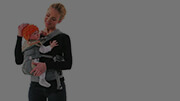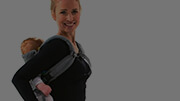All Position Baby Carrier
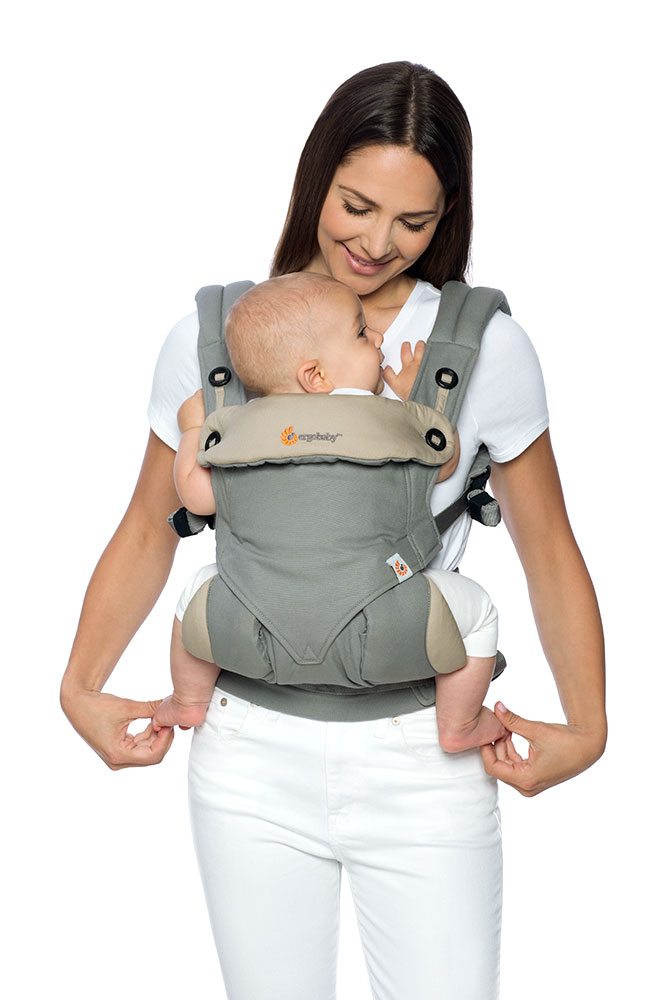
~0+ Months (with infant insert) /
~4+ Months (without infant insert)

~5+ Months
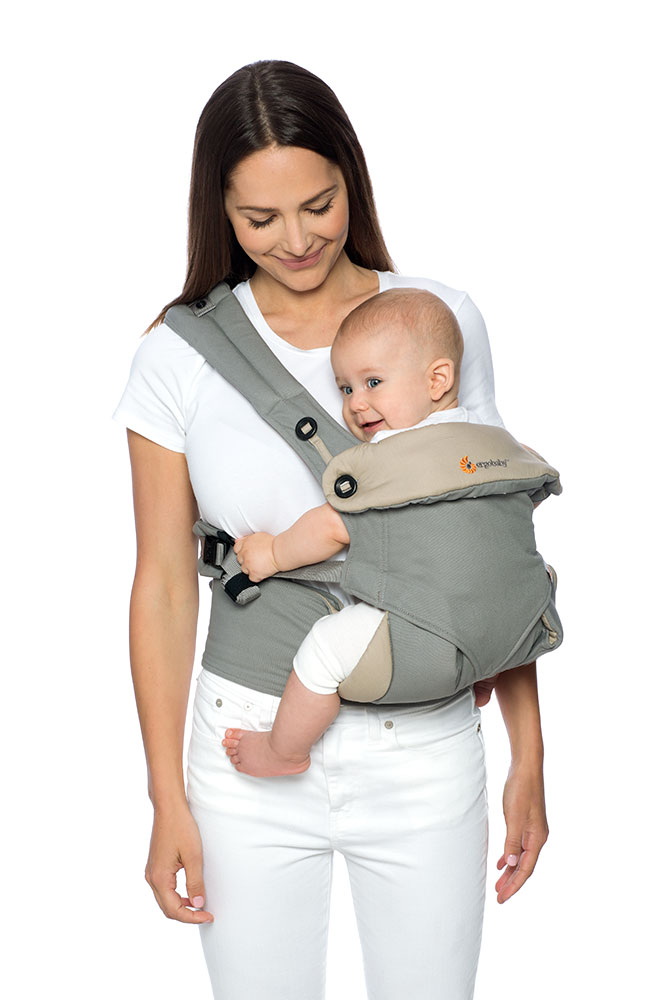
~6+ Months
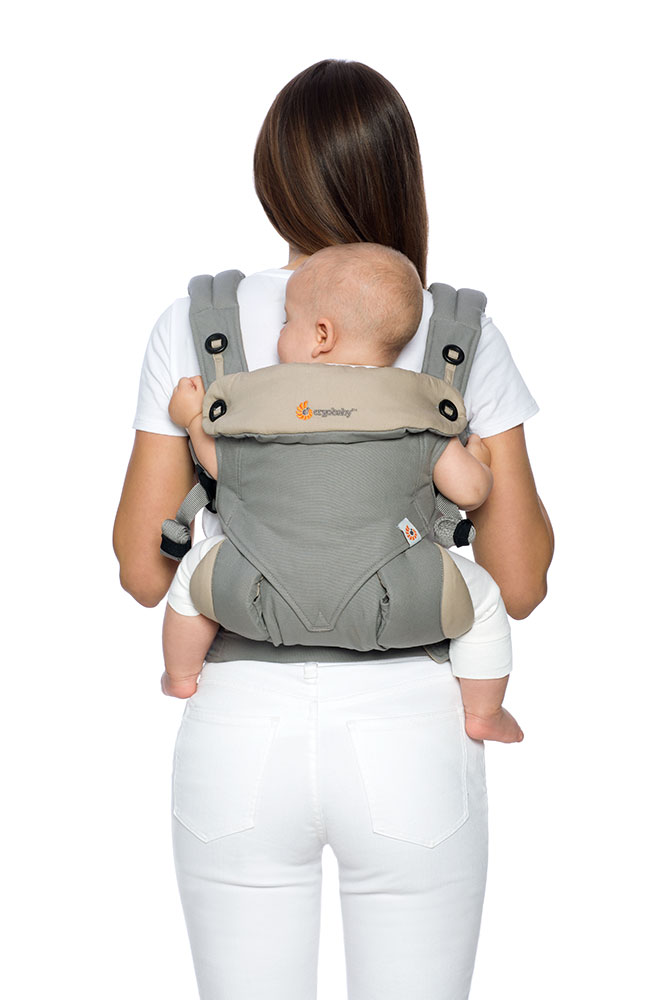
~6+ Months
All Positions - Maximum Comfort


Instructions
Manuals
360 Baby Carrier Instructions - Click Here
360 Baby Carrier & Infant Insert Instructions - Click Here
FAQS
-
Where should the lumbar support on the 360 All Positions carrier be positioned?
Front Inward / Front outward carry: Centered in lower back Quick check: The two webbing straps on each side of the waistbelt should be of even length to ensure proper centered position of the lumbar support Hip carry: Centered in lower back The two webbing straps on each side of the waistbelt will not be even in length. Back carry: Centered in abdomen Quick check: The two webbing straps on each side of the waistbelt should be of even length to ensure proper centered position of the lumbar support
-
What is the difference between the Ergobaby 360 Baby Carriers?
The All Positions 360 Cool Air Mesh Baby Carrier offers parents and babies the same comfort and ergonomics as our cotton All Positions 360 carriers, with the added benefit of a cooler design, ideal for an active lifestyle or warmer climates. Its breathable, double sided, 3D Air Mesh fabric panel and mesh lining keeps baby and parent cool thanks to more airflow. 360 Cool Air Mesh carrier is made of 100% Polyester fabric that is machine washable, easy to dry and easy to take care of, while our other 360 carriers are made of 100% Premium Cotton fabric. Both the All Positions 360 carrier in cotton and Cool Air Mesh have a lumbar support waistband with buckle. However, some of our older models may have a Velcro waistband instead.
-
Up to what age can and should I carry my child in the 360 carrier, and for how many hours a day?
Carrying isn't a mandate, but rather the most simple, healthy and easy way to transport a child while promoting a strong bond between the parent and the child. Parents and children should together determine which position and duration is preferred and most comfortable. Follow your baby's lead and respond to her cues. As with all Ergobaby baby carriers, the 360 All Positions carrier can be used from birth (with the Ergobaby Infant Insert) up to approx. 45 lbs. (3.2 to 20 kg). The child's weight is evenly distributed between the shoulders and waist ensuring long, comfortable periods of carrying.
-
Can I also use the 360 All Positions carrier from birth on?
The 360 All Positions carrier can be used with our unique, infant insert to carry your baby from birth (starting at 7 lbs./3.2 kg and above). We recommend for the 360 All Positions carrier only be used to carry children in the 'facing out' position once they are 5 months or older, and even then only for short periods of time. Prior to that, the 'facing in' position on the parent's chest is the preferred and most comfortable solution.
-
Can I breastfeed with the 360 All Positions carrier? How does that work?
Yes, as with all of our Ergobaby Carriers you can breastfeed while on the go. This can be done in either the hip or front-inward carry positions.
-
Is the 360 All Positions carrier safe?
The 360 carrier meets high safety standards. As with all our carriers, it includes safety mechanisms on the hip and shoulder belts. It was developed in collaboration with midwives and baby carrier consultants and extensively tested with parents of babies ranging in age from newborn to 4 years of age.
-
As a parent, how do I decide: What is better for my child, 'facing in' or 'facing out'? And how do I know?
Parents know their children and are in the best position to decide the optimal way to wear their children. Various factors should influence this decision such as the setting, the child's mood, and the approximate carrying time. The 360 All Positions carrier allows you to quickly change between facing in or facing out when circumstances and situations change.
-
With the 'facing in' position, the infant's head is supported; when worn front outward, is there head support for baby?
We recommend that the 'facing out' position be used when baby has 1) demonstrated proper head and neck control and 2) Can sit up right, unassisted.
-
What do midwives and baby wearing consultants have to say about Ergobaby's 360 All Positions carrier?
Midwives and baby wearing consultants appreciate having a truly ergonomic carrier to recommend to parents. They feel comfortable recommending the facing out position for babies 5 months and older. They suggest the 'facing out' position be used for short periods of time. It is our hope that the 360 All Positions carrier may inspire more parents to try and embrace baby wearing without losing sight of the ergonomic aspect for their babies and themselves.
-
Can I alternate between front-inward and front-outward positions with the carrier on?
Yes you can! Just make sure you support your baby securely as you switch between the black/grey buttons on the bucket seat.
-
Is forward facing comfortable for parents?
Although we have designed the carrier to distribute baby's weight as well as possible, parents will always find baby facing in, hip, and back positions more comfortable. This is due to the weight of the baby resting on the parent instead of away from the parent like they do when 'facing out'. If parents become uncomfortable when baby is facing out, they can quickly and easily transition their baby to any of the other carry positions.
-
Is the front-outward position ergonomic for the baby?
Yes, the Ergobaby 360 Carrier ensures that babies are seated in the ergonomically correct, "M" position with knees even to or higher than hips, and a rounded spine. This is true for all 4 carry positions. The bucket seat ensures baby's back will be curved not arched, allowing baby to always be seated ergonomically in all four carry positions. The seat also allows the baby's bottom to be fully supported and prevents pressure on baby's crotch area.
-
How do I know if my baby is ready for front-outward facing position?
Once your baby can see above the front panel of the carrier, has strong head & neck control, and has a natural curiosity to see and interact with the world, they are ready for front-outward carry. We recommend starting with short durations (5-10 minutes) to prevent over-stimulation. If baby shows signs of over-stimulation (zoned out, catatonic, fussy, tired) or sleepiness, just turn them back around to face you so they can find comfort and rest.
-
There is a belief that only the 'facing in' position puts children in the anatomically correct "M" sitting position. How did you resolve this problem?
As one of the leading manufacturers of baby carriers, we knew that any solution we created had to offer full ergonomic benefits in all positions. We designed the 360 All Positions baby carrier with a structured bucket seat, ensuring the correct "M" sitting position is maintained even in the 'facing out' position. At the same time, the child's pelvis is gently tipped toward the rear when placed into the carrier, so that the child's upper spine makes contact with the parent's body along its full surface, which supports the physiology of a baby's slightly rounded back.
-
What are the buttons at the base of the shoulder straps used for?
These buttons hold the back panel in place. For additional head and neck support (used for the inward facing positions), fold the panel up and use the top button to buckle in place. Fold the panel down when not in use and secure with the bottom button (Ergobaby logo facing out).
-
What are the age and weight guidelines for the 4 carry positions?
These references to ages by months are only general guidelines and each baby's development is different.
- Front/Inward with Infant Insert (sold separately): 0 - 4 months; 7-12 lbs / 3,2 - 5,5 kg
- Front/Inward without Infant Insert: 4 - 24 months; 12-26.9 lbs / 5,5 - 12 kg
- Front/Outward: 5 - 12 months; 14-22 lbs / 6-10 kg
- Hip: 6 - 24 months; 17.2-26.9 lbs / 8-12 kg
- Back: 6 - 48 months; 17.2-45 lbs / 8-20 kg
-
Can my baby face outward in the Ergobaby 360 carrier?
Yes, the 360 All Positions carrier allows you to carry your child facing you, facing out, on your hip, or on your back.
-
Are the Baby Carriers and Infant Inserts machine washable?
Yes, all of our Carriers and Infant Inserts (plus insert pillow) are machine washable.
-
At what age can I carry my baby in the back carry position?
Each parent and child is different but usually around 6 months your baby will be ready to be carried on the back and parents are comfortable not having their baby in direct line of sight. Baby must have strong head and neck control and be comfortably seated consistently in the carrier in an ergonomic, "M" position (baby's knees at or higher than baby's hips). People with larger babies who are more developed may choose to put their baby in the back carry position even earlier than 6 months especially for longer carry times since many parents find it more comfortable to wear heavy babies on their backs.
-
At what age can a baby face outward?
Every child develops at their own pace, and parents should decide what is right for them and their baby. Most babies should be ready to face out for short periods of time starting at 5 months of age.
-
Why has the weight limit increased?
When it launched in 2014, our Ergobaby 360 Carrier was tested and passed at the 45 lbs / 20 kg weight rating. Because this carrier was our first forward facing model, we voluntarily lowered the weight rating to ensure that parents were using it correctly. Since the launch of the 360, many parents have been asking why it has a lower weight rating and given the carrier's massive popularity globally, we have re-examined our initial decision and feel confident expanding the weight rating. We've done all the work and independent testing to ensure that this carrier is safe, durable and comfortable for you and baby at 45 lbs / 20 kg. Enjoy!
-
I purchased my 360 carrier when it claimed a lower weight limit. Can I use my carrier up to 45 lbs / 20 kg. now?
Yes, we hold our products to higher standards than industry requirements. This means your carrier has always been able to support a child up to 45lbs / 20kg. However, we took the extra step to re-test the 360 on safety, durability, and comfort before making this recommendation. So, rest assured!
-
Why did the velcro waistband on the All Positions 360 carrier change to the lumbar support waistbelt with buckle?
We value ergonomic comfort for parent, and we listen to our customers. When so many parents tell us how much they like the lumbar support waistbelt on the 360 Cool Air Mesh, we decided to change to the same lumbar support on the regular 360 carrier. The double adjusters on the waistbelt also make it easy for parents to adjust and tighten in all positions.
-
I find the buckle waistbelt on the 360 All Positions carrier hard to adjust. What can I do?
To tighten the waistbelt, pull on each end of the waistbelt little by little until you get a tight fit and the lumbar support is centered on your back. You can also try to alternately pull the ends of the waistbelt up and down until you get a tight fit and the lumbar support is centered.
-
What is the age range of the 360 Cool Air Carrier? Does it need an Infant Insert for my newborn baby?
The recommended age range of the Ergobaby 360 Cool Air is the same as our All Positions 360 baby carriers. It supports babies from 12 up to 45 lbs / 5,5 kg up to 20 kg with the carrier only, and babies from 7 to 12 lbs / 3,2 to 5,5 kg with the use of the Ergobaby Infant Insert (sold separately). Infants more than 12 lbs / 5,5 kg but younger than 4 months or without strong and consistent head and neck control must use the Infant Insert with the carrier.
-
Why do I need the Easy Snug Infant Insert and how long do I need to use it?
Our Easy Snug infant inserts are designed so that you can carry your newborn baby both ergonomically and comfortably in a soothing, nest-like comfort close to you, for a cozy transition to the world from the womb. The Ergobaby Easy Snug infant insert was designed for use with Ergobaby carriers (at the exception of the Omni 360 and Adapt carriers which does not require an infant insert) for babies from newborn up to age ~4 months (from 7-12 lbs / 3,2 - 5,5 kg), or for babies more than 12 lbs / 5,5 kg but younger than 4 months or without strong and consistent head and neck control. It is designed to provide head and neck support and to ensure your newborn is seated both comfortably and ergonomically while in the Ergobaby Carrier.
The fan- shaped design securely attaches to Ergobaby's Original or All Positions 360 carriers, for an intuitive loading of baby and more airflow, while providing all the extra thigh, spine, head and neck support your baby needs in his early months.
The bottom pillow in the Easy Snug infant insert can be removed from the insert and placed inside the carrier, with your baby sitting on top of it. The use of the pillow alone is for babies with strong and consistent head and neck control who are either too short to bend at the knees when seated in the Carrier or would like to be seated higher in the Carrier.
For older babies who still need head and neck support, but can already be seated in the carrier, you can use the shell of the Easy Snug infant insert without the pillow to provide proper support.









